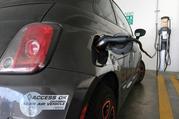- California Assembly OKs highest minimum wage in nation
- S. Korea unveils first graphic cigarette warnings
- US joins with South Korea, Japan in bid to deter North Korea
- LPGA golfer Chun In-gee finally back in action
- S. Korea won’t be top seed in final World Cup qualification round
- US men’s soccer misses 2nd straight Olympics
- US back on track in qualifying with 4-0 win over Guatemala
- High-intensity workout injuries spawn cottage industry
- CDC expands range of Zika mosquitoes into parts of Northeast
- Who knew? ‘The Walking Dead’ is helping families connect
CALIFORNIA MAY BEEF UP ELECTRIC VEHICLE MANDATE
SACRAMENTO, Calif. (AP) — A California lawmaker told The Associated Press on Friday that she’s introducing legislation to require that 15 percent of new vehicles be emission-free in less than a decade, a significant escalation in the state’s efforts to speed the evolution of new car technology.
Automakers that fail to sell enough electric vehicles would be required to make payments to rivals that do or pay a fine to the state under legislation to be introduced by Assemblywoman Autumn Burke, D-Los Angeles, next week.
“If we create more competition in the market, that automatically will trigger a more affordable vehicle,” Burke said in an interview.
The legislation comes as an effort to extend the state’s landmark climate change law until 2030 falters in the state Assembly and sets up a showdown between powerful environmental advocates and automakers in the frenzied final weeks of California’s legislative session.
Burke’s proposal would beef up California’s existing vehicle mandates, which require automakers to gradually introduce cleaner vehicle technology.
Under current law, automakers accumulate credits for selling vehicles with cleaner technology and must hit annual targets. Environmental advocates say automakers have stockpiled credits for future use and won’t have sufficient incentive to sell electric vehicles at affordable prices, preventing the state from meeting its goals for greenhouse-gas reduction.
“The current credit program just does not appear to be working,” said Kish Rajan, a spokesman for CalInnovates, an industry group for the technology sector, and a former Brown appointee. “At least it’s not working fast enough to get toward the goals that the governor has laid out and that CARB is seeking to enforce,” he said, referring to the California Air Resources Board.
Vehicles that now get credits toward complying with the environmental mandates, such as plug-in hybrids, would not be eligible to meet the 15-percent mandate.
Electric and plug-in hybrid vehicles now account for about 3 percent of California new-car sales, according to the Air Resources Board, which administers California’s climate laws.
Wade Newton, a spokesman for the Alliance of Automobile Manufacturers, characterized the legislation as a giveaway to Tesla Motors, the Palo Alto, California-based company that’s moving to rapidly expand its production of electric vehicles.
“Automakers are striving to meet California’s long-term (zero-emission vehicle) program by providing consumers with innovative vehicles, so we oppose this last-minute, fundamental change to the program,” Newton said in an email. “Tesla shouldn’t be able to rig the market for their own purposes.”
Tesla did not immediately respond to a request for comment.
Democratic Gov. Jerry Brown issued an executive order in 2012 calling for 1.5 million zero-emission vehicles on the road by 2025; 192,000 have been sold since 2010, according to the air board.
Brown supports Burke’s proposal, spokesman Gareth Lacy said in an email.
It “will lead to more zero emissions vehicles and more Californians able to purchase them – and that’s a smart investment in cleaner air,” he wrote.
Brown has traveled the world promoting California’s ambitious agenda to fight climate-changing emissions. But he has struggled to advance legislation to continue the programs for another decade and set more stringent goals.
Moderate Democrats in the state Assembly, some backed by the oil industry and hailing from less-affluent inland districts, have been reluctant to bless the most strident emission standards for fear of raising energy prices. The coalition of lawmakers blocked previous Brown-endorsed legislation that aimed to cut petroleum use in half by 2030.
Burke said she believes her electric vehicle legislation is more likely to succeed in the Assembly than the overall climate package because it would encourage the sale of lower-priced electric vehicles that would be available to larger swaths of the middle class.











